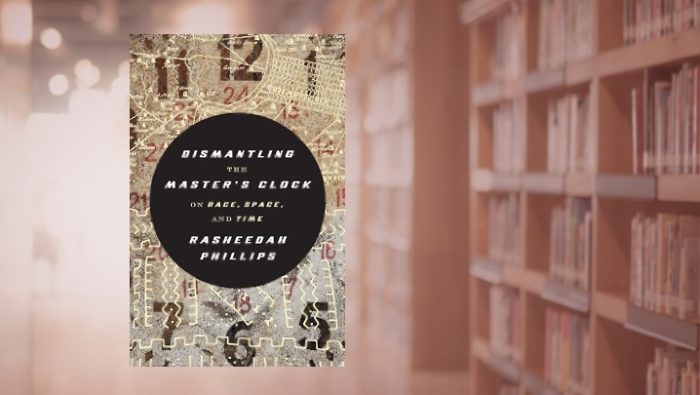
Race, Time, and Quantum Physics

Consider these three experiments in time:
DIY Time Travel. It is 2012. The writer, legal activist and artist Rasheedah Phillips creates a workshop encouraging participants to craft quantum time capsules. She wants to explore relationships between Black cultural experiences, quantum physics and time, to encourage lines of communication with future generations. Working with the poet, musician, and activist, Camae Ayewa, Phillips develops a project supporting participants to make communal quantum time capsules out of a shoebox and mirrored paper, with prompts asking them where they would bury the capsule, what items they would place in it, and how they would avoid the items deteriorating. Later “unsealing ceremonies” will release new understandings and experiences of time. As Phillips later puts it: “… quantum time capsules serve as radical tools for transgressing linear conceptions of time. [They] act as conduits, amplifying experiences and narratives typically relegated to the fringes of history and projecting them across a multiplicity of temporal planes” (p.295).
CPT: Coloured People’s Time/Charge, Parity and Time Reversal. It is 2020. As part of their work for the Collide Residency at CERN (Conseil Europeén pour la Recherche Nucléaire), Phillips and Ayewa, working as the Black Quantum Futurism Collective (BQF), establish conversations traversing everyday life and quantum physics. Collaborating with astronomers, theoretical and experimental physicists, and engineers, Phillips relates foundational questions in quantum physics, such as charge, parity, time reversal symmetry, entanglement, and black holes, with Black temporalities and African conceptions of time. She later writes: “A more dynamic view of [quantum physics], informed by Black and Afrodiasporic epistemologies, opens new avenues for reshaping not just our cosmic understanding but the very fabric of our social and political realities.” (p.88).
Time Zone Protocols and the Prime Meridian Unconference. It is 2020. Phillips begins a two-year residency at the New School’s Vera List Center for Arts and Politics. Her research focuses on how time protocols – norms, social contracts, and political agendas that create formal and informal rules for measuring and adhering to time – affect marginalised Black communities in the United States. She uncovers historical and contemporary time protocols arising from Western technologies (sea clocks, quadrants, time zones, daylight savings time (DST)) and their effects on Black populations (e.g. the disproportionate negative effects on Black communities of DST). She creates posters countering DST propaganda, with slogans such as “Restore Black Space-Times” and develops a DST Tracker and Chrono-Assessment tool to assess the effects of DST on individuals and communities. The fellowship will culminate in a Time Zone Protocols exhibition and a Prime Meridian Unconference in 2022 which “unmap” Black temporal experiences from Greenwich Mean Time through alternative protocols, resolutions and time zones.
These are only three limited snapshots of a vast array of arts-based experiments and critical analysis contained in Phillips’s recent book: Dismantling the Master’s Clock: On Race, Space, and Time (AK Press, 2025). Written as an anti-linear collection of essays, Dismantling the Master’s Clock makes the case for creating pathways of liberation for Black communities through decolonizing and reclaiming time. Phillips writes:
“This book ultimately posits that by decolonizing time – by breaking free from the master’s clock that has been instrumental in sustaining systems of oppression – we can forge new pathways for liberation that are attuned to the realities, histories, and futures of Black communities. The act of reclaiming both time and the nature of reality itself is a profound step toward manifesting temporalities where Black experiences and knowledges are centered.” (23)
A profound conceptual engagement with the power of Black theories and temporal experiences, this multi-faceted book, full of energy and insight, articulates a reparative and transformative vision for community arts-based work to elicit and recentre Black temporal ontologies in a world dominated by white, neo-colonial practices of time. The book – and the experiments it draws on – defies categories in all the ways it needs to. It has deep academic significance and is written for a wide audience; it develops theories of time through arts-based collaborations interwoven with extensive social, legal, and historical critique; and it is unashamedly eclectic and theoretically ambitious.
Dismantling the Master’s Clock has the power to elucidate, inform, and motivate Socio-Legal scholars to mobilise arts-based practices as a core aspect of our social-justice-informed research. More specifically, the book demonstrates how Socio-Legal research, particularly on questions of time, can be advanced through arts practice. Phillips worked for over a decade as an attorney at the Community Legal Services of Philadelphia and has firsthand experience of the racialised effects of housing law. Her work in legal practice shaped her profound insights on the racialised temporal effects of law, particularly in areas such as housing, poverty law, and public services, where class and race inequalities intersect. Phillips cites examples of time oppression and time poverty, ranging from short notices on evictions, to zoning, sundown towns, and gentrification-driven redevelopment. BQF went on to address contemporary time oppression through its local Community Futures Lab in Sharswood, North Philadelphia, adopting oral histories as a technique of visioning alternative futures. BQF’s integration of arts methods, which includes quantum event maps, sonic journeys, housing journey maps, was a “deliberate effort to challenge and expand the conventional boundaries of legal and policy advocacy” (234). Along with the experiments presented above, the book shows how becoming immersed in arts-based practices can create powerful material interventions – DIY time travel, Time Zone Procotols – that change the ways that Socio-Legal scholars see, negotiate, and construct time.

